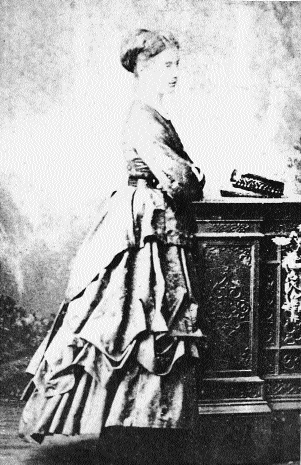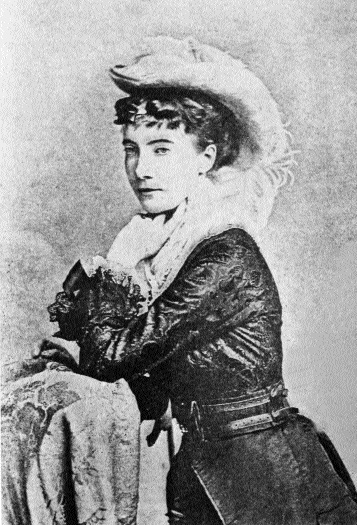20 September 1911: Anna Catherine Parnell [above] died on this day. She was the estranged sister of Charles Stewart Parnell, the Irish Parliamentary Leader who tried so hard to gain Home Rule for Ireland.
When her brother was campaigning in America for the Land League in 1879/1880 she and her feisty older sister Fanny Parnell [below] used their own vehicle to help the peasants of Ireland in their fight to break the power of the Landlords of Ireland. This was the New York Ladies’ Land League that Fanny had set up in the USA to help her brother’s fund raising campaign over there. This was used in a successful campaign which raised thousands of dollars for transmission to Ireland.
On Anna’s return to Dublin in late 1880 and at the suggestion of Michael Davitt it was decided to set up a similar structure back Home. Thus on 31 January 1881 the Ladies’ Irish National Land League was founded, with Anna Parnell as its effective leader. Not everyone was happy about this or its usefulness to the Cause. However they grew rapidly, with more than five hundred branches of the Ladies’ Land League throughout Ireland by the beginning of 1882.
But things changed radically in October 1881 when Parnell was arrested and imprisoned in Kilmainham jail Dublin. With most of the male leaders imprisoned or on the run the LLL took over what effective help could be given to the hard pressed followers of the League’s programme, namely that of securing ‘the land of Ireland for the people of Ireland’ by a programme of peaceful and constitutional action.
With the Leadership behind bars the shadow of 'Captain Moonlight' was soon felt in the fields and villages of Ireland as Agrarian agitation took hold. This was the field that Anna and her League pushed to the limits without going over the line. To some though their tactics were just a bit too radical for some people’s liking. Some rejected them and some protected them. It is true that they spent money profusely to push as hard as they could to force the hand of the British Government to relent - and break the grip of the Landlords to the ownership of so much of the Land of Ireland. But under the circumstances where time was of the essence they might have felt justified in doing so.
When Charles S Parnell was released in May 1882 under the terms of the ‘Kilmainham Treaty’ the Ladies League felt somewhat betrayed by its terms. Charles had never really felt comfortable with the idea of women being involved in politics - then an exclusively male affair. He examined the books kept by Anna of the records of her organisation and found them wanting. The LLL had run up debts of some £40,000! Charles then made his sister an offer she could not refuse: In return for paying off its debts the League was to be wound up and disbanded. Anna had no choice but to agree. But she never forgave her brother.
That year was to bring more heartbreak as her beloved sister Fanny passed away at an early age in the USA. Anna and Fanny shared with Charles a keen interest in Irish nationalism, and at the age of sixteen Fanny published her first poems in the Fenian newspaper, The Irish People. She became a prolific author of verse, much of it on patriotic themes, and her most famous poem, ‘Hold the harvest’, published in 1880, was described as the ‘Marseillaise of the Irish peasant.’ However, her health was poor and, though politically committed, much of her short life was spent out of Ireland.
But when Fanny died her spirit was broken and she drifted away from Ireland and Irish politics. Charles tried at a reconciliation but she was having none of it and indeed cut him when once their paths afterwards inadvertently crossed. She did though publicly defend her brother's political reputation in the wake of the Kitty O’Shea divorce scandal and his subsequent Downfall and death in 1891. She forayed briefly into an Irish bye election in Longford in 1908 but was disillusioned with the way she was treated.
She drifted from place to place in England under a multitude of assumed names and lived in a state of genteel poverty for much of it. She engaged in intermittent correspondence with political sympathisers back home but she became something of a Recluse. Very few of her acquaintances in the towns of England had a clue who she was and her relationship to Ireland’s fight for justice. She was however moved to write her own account of her role in the momentous events of the early 1880s that she had such a prominent but brief role in shaping. It was called The Tale of a Great Sham. However try as she might she could never find a publisher willing to cover the costs of publishing it. Indeed it was only in 1986 that a long lost copy was found and finally saw print.
After many moves in 1910 she re-located to the picturesque north Devon town of Ilfracombe where she went under the name of ‘Cerisa Palmer’. She had an early interest in art and indeed had been a painter of some merit in her early years. Perhaps that was why she moved to this spot to see out her last years. Her end came on a beach there on 20 September 1911 when she was drowned while swimming in the sea. She was 59 years old. A few days later she was buried in a local churchyard not as Anna Parnell but under her assumed name of ‘Cerisa Palmer’.
Katherine Tynan the Irish novelist and writer wrote of her a few years later, ‘her life ought to have been written, for she was a great woman, and yet I think that she herself would have preferred that her name be writ in water.’
And indeed while Anna was largely written out of Irish History it can hardly be denied that she played a part in her virtual disappearance from its pages.


No comments:
Post a Comment